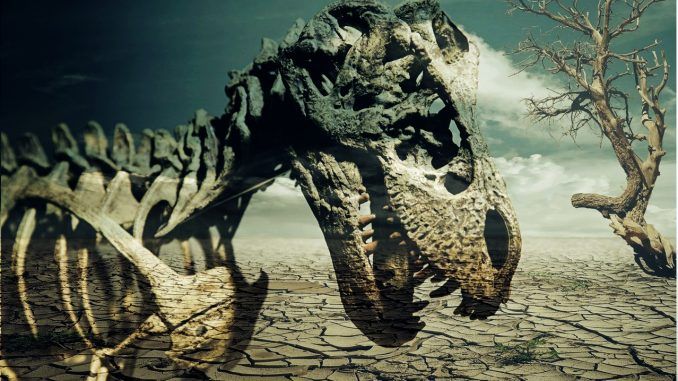
A mathematician from MIT predicts the 6th mass extinction event is right around the corner and will be with us by the year 2100, and it is due to the fourth most abundant element in the universe, carbon, shifting its position within the earth’s atmosphere.
According to a study, the earth’s carbon deposit is shifting its way into the oceans, and certain mathematical models predict that four out of five mass extinction events of the last 540 million years were due to the carbon cycle.

The good news is that while carbon isotopes battle it out for prominence, it takes around 10,000 years for the event to play itself out.

BYPASS THE CENSORS
Sign up to get unfiltered news delivered straight to your inbox.
You can unsubscribe any time. By subscribing you agree to our Terms of Use
Let’s hope afterwards dinosaurs won’t show up eating Claw Lickin Kentucky Fried Humans, at the rate that Homo sapiens gobbled up the dinosaur’s descendant, the chicken.
From the Daily Sheeple:
Rothman began his math journey to determine our next extinction by investigating fluctuations in the carbon cycle. The carbon cycle is the path carbon traces through Earth’s land, oceans, and atmosphere that has occurred over the last 542 million years. By analyzing 31 established carbon isotopic events recognized by geochemists, Rothman identified the ebb and flow of carbon–12 and carbon–13, which are two isotopes of carbon whose abundance has varied considerably in Earth’s history.
From this information, he constructed a database to assess how much carbon mass was pumped into the world’s oceans in each historical event. In most of these episodes, the carbon volume stayed under a certain threshold. But in some of them (including four of the past five mass extinction events that exterminated multitudes of life-forms on the planet) that threshold was breached. “It became evident that there was a characteristic rate of change that the system basically didn’t like to go past,” Rothman said about his findings.
According to Rothman’s math, there are only two ways carbon levels can exceed the threshold of a catastrophe. One is where CO2 emissions slowly swell over thousands and millions of years, slowly triggering a global calamity. The other case occurs on a much shorter timescale, where an immense shift in carbon volumes moving through the carbon cycle happens in the space of say, decades or years.
Rothman warns that by the year 2100, about 310 gigatons of carbon will have been added to the oceans. This is a potential “tipping point” for an ecological disaster, according to his study. That’s also the minimum amount of carbon expected to enter earth’s oceans by 2100. When CO2 dissolves into the ocean as it did in the case of the End-Permian mass extinction, all life on Earth is at risk.
The formula predicts that by the end of the century oceans will hold enough carbon to launch a mass extermination of species in the very near future. Rothman also stated that it would take about 10,000 years for the disaster to completely play out.
See Also: Supermassive Black Holes Mysteriously Align In Distant Universe
Edmondo Burr
CEO
Assistant Editor
Latest posts by Edmondo Burr (see all)
- Police Arrest Suspect In Supermarket Baby Food Poisoning - October 1, 2017
- Seoul Secures Data From Electromagnetic Interference By N Korea - September 30, 2017
- The ‘World’s First Internet War’ Has Begun: Julian Assange - September 30, 2017

So far it is still glyphosate (Monsanto Roundup active element) deposits into the ocean reservoir that is killing all plankton life in the oceans. If anyone paid attention to biology class, one will know that this is the root of the marine food chain. Meaning, most all marine life will die off due to this. Glyphosate has now reached the point where Earth’s water-cycle-loop is depositing it into the oceans. (Farmlands – ground-water – river track – ocean dump)
Radiation from many plant’s and especially Fukoshama are killing off our Plankton as well what most folks don’t know is that the plankton provides the majority of Oxygen in our atmosphere. The supposed “cleanest power on earth” is killing our oceans thus the planet.
” Economic pundits study trends and make projections, so do sociologists and experts from all the synthetic sciences, where the results reflect the conclusions they are paid to fabricate and deliver.” Dog Poet
4 out of 5 when 2 were known to be asteroids/comets ?